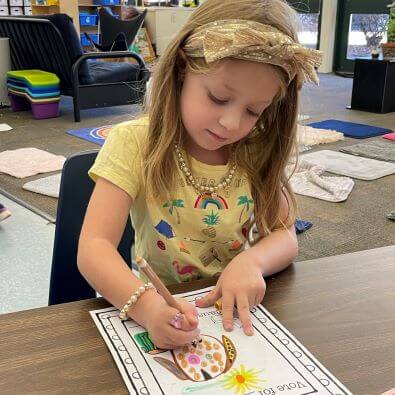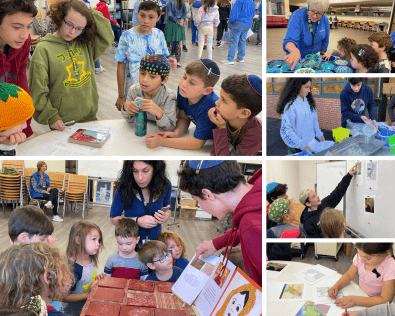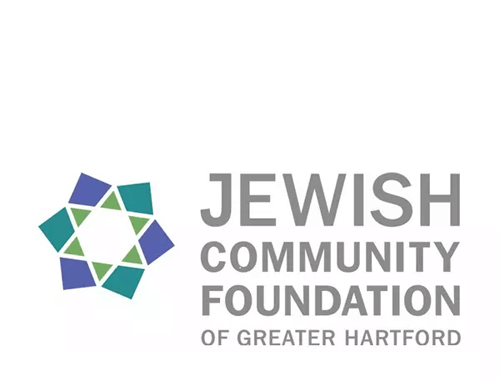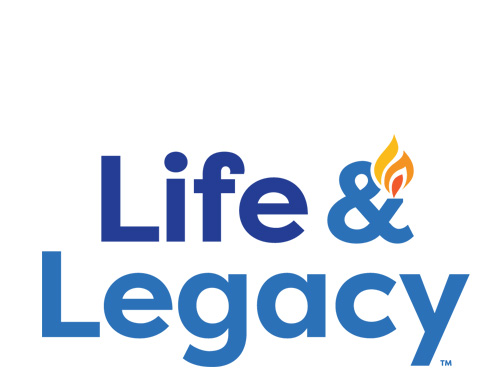Schechter Shavua: November 11, 2022
Elections Provide Lessons for All Ages
 This week, each of the classes were engaged in lessons and activities related to elections. It’s fun to track the age-appropriate ways that each class learns about the same topic. See for yourself!
This week, each of the classes were engaged in lessons and activities related to elections. It’s fun to track the age-appropriate ways that each class learns about the same topic. See for yourself!
Ilanot(Kindergarten) started with a KWL discussion for elections (What do we Know? What do we Want to Know? And what have we Learned?) Students read the book Duck For President, discussed what an "informed decision" is, and did a pro and con activity to analyze different snacks. After registering to vote, students then made informed decisions as they voted on their favorite class snack. The winning snack (cookies!) was enjoyed on Wednesday.
Anafim(grades 1-2) voted on their favorite snack as well as their favorite pet. Students learned that you can’t just show up and vote; you also need to be registered. They created their own voter registration cards and then designed campaign posters to promote their candidates. The excitement was palpable as the votes were tallied. In an interesting turn of events, a tie led to a run-off vote among the top pet candidates. And the winners were: popcorn and dogs!
Alimstudents (grades 3-4) read about voting and election day. Then, working in small groups, students created a timeline about the implementation of voting rights over the years. The students then created their own voter registration ID cards and used them to cast a private vote at the Alim voting booth. The question on the ballot: should daylight savings time become permanent?
Nevatimstudents (grades 5-6) read about and discussed the history of the 15th and 19th Amendments as part of a larger understanding of the history of voting rights in America: who could vote when our country was founded? Whose voting rights had to be fought for? Students also wrote about why voting is important.
Perahimstudents (grade 7) have been discussing this topic for a week, learning what they as voters need to know about candidates running in local elections. On Election Day, they used the educational online resources from iCivics, to learn about the importance of researching candidates running for office. The students were also introduced to Fannie Lou Hamer, who fought against a brutal system so she could exercise her right to vote.
Amirimstudents (grade 8) discussed the history and significance of midterm elections. This led naturally into a discussion around media literacy (what is it) and its place in local, state, and federal elections. Students engaged in a spirited discussion about the role of social media, what constitutes a fact, and how to determine fact from misinformation online.These critical skills will be important as students grow up in a world where it will be increasingly more difficult to detect what’s real and what’s not.
To see the range of age-appropriate election activities and discussions, click HERE.
One Book Provides Lessons for the Whole School
by Special Guest Authors: The Amirim (8th grade) class
 Last Friday, Schechter’s eighth-grade students organized and hosted the “One Book, One School” event which tied into their summer reading assignment. Over the summer, middle school students and faculty read the autobiography of Malala Yousafzai, which fueled the inspiration for the activities that were created and presented to the rest of the school. The 8th graders designed these activities to help the younger students (Shorashim through 7th grade) develop a deeper understanding about Malala and her home country of Pakistan. Activities included:
Last Friday, Schechter’s eighth-grade students organized and hosted the “One Book, One School” event which tied into their summer reading assignment. Over the summer, middle school students and faculty read the autobiography of Malala Yousafzai, which fueled the inspiration for the activities that were created and presented to the rest of the school. The 8th graders designed these activities to help the younger students (Shorashim through 7th grade) develop a deeper understanding about Malala and her home country of Pakistan. Activities included:
- a water/sand table to bring awareness about the recent Pakistani monsoons,
- a map-finding game to locate Pakistan in the world,
- a henna-drawing art project to bring some of Pakistan’s culture to Schechter,
- an education activity comparing schools in Pakistan to schools in the United States.
The younger students were engaged throughout; many told their Amirim peers what they learned and how much they enjoyed the activities. The eighth grade would like to thank their Humanities teacher, Mrs. Simon, for her help and guidance as they organized this fun-filled morning; the Early Childhood classrooms for donating materials needed for different activities, and Art teacher, Liane Fisher, for working at the henna activity and for teaching students to create traditional Pakistani art which is on display in the lobby.
To see photos of the One Book, One School event, click HERE.
Modeh Ani Prayer: Reminders to be Thankful
The Alim class (grades 3-4) learned about the Modeh / Modah Ani prayer, which is about gratitude for waking up, and compared it to berakhot (blessings) that we say in services, at meals, etc. This prayer is said every morning--and soon afterwards, we recite a series of berakhot called Birkhot Hashahar . In class, the students illustrated what they are thankful for, and connected that to their favorite blessing from Birkot Hashahar.
Those prayers are all about gratitude. They also learned that in general, some prayers are said when we are thankful, while others ask for something. When we say a berakhah, we are saying "Thank you G-d for your gift"-- or we are asking for something we need. Either way, we are expressing our values, and trying to connect to God.
Parashat Vayera—Deep Canvassing, Real Conversations, and Abraham’s Tent
 In this week of elections, I find myself thinking a lot about different kinds of political marketing. Candidates, political parties, and shadowy interest groups pour hundreds of millions of dollars into mass advertising campaigns. These kinds of campaigns saturate mass markets; whether on radio, television, or social media, you can’t escape the messages. (Although moving can help! Compared to what I experienced in Ohio and Michigan, we are relatively sheltered here in Connecticut.) The messages may be personalized slightly by algorithms, but ultimately they are impersonal—and they tend to fuel resentment and division in our society.
In this week of elections, I find myself thinking a lot about different kinds of political marketing. Candidates, political parties, and shadowy interest groups pour hundreds of millions of dollars into mass advertising campaigns. These kinds of campaigns saturate mass markets; whether on radio, television, or social media, you can’t escape the messages. (Although moving can help! Compared to what I experienced in Ohio and Michigan, we are relatively sheltered here in Connecticut.) The messages may be personalized slightly by algorithms, but ultimately they are impersonal—and they tend to fuel resentment and division in our society.
But these massive advertising campaigns aren’t the only way beliefs are changed. Door-to-door, person-to-person interactions can have a tremendous impact on how we view the world—and while even a short conversation can make a difference, there is a framework called “deep canvassing” that is even more powerful. What’s special about deep canvassing? The amount of listening that’s involved. You don’t knock on someone’s door and tell them how they should vote; instead, you ask, with genuine openness and empathy, what is important to them. You share your story as part of a conversation. Your end goal may be to influence their thinking, but you aim to do so through a true interaction. And however the person ends up voting, the conversation is part of an effort to heal the rifts in our society.
I had all of this in mind when rereading the very beginning of this week’s parashah, and thinking about Abraham. It’s true that Abraham wasn’t running for office—but he was chosen to spread a message. In the aftermath of the Flood, God seems to have realized that if the arc of the world was to bend towards justice and kindness, God would have to work through a human being to spread those values. This was Abraham’s mission.
It’s interesting, then, that instead of having Abraham stay in large populated cities like Ur or Haran, God told Abraham to go to the unsettled parts of Canaan. Instead of setting up a soapbox in a town square, God had Abraham and Sarah live in the wilderness, welcoming a few guests at a time. In a midrash, the rabbis share a beautiful image of a tent with doors on all four sides—the better to make everyone feel at home. Visitors might come from different places, and be headed in different directions—but all would be affected by the kindness they had encountered.
This vision shapes our culture at Schechter. We believe that our conversations and connections can help us build a better future for our community and society. May we all keep our tent open on all sides!
Shabbat shalom,
Rabbi Jonathan Berger
Head of School
Questions for the Shabbat table:
1. We often focus on Abraham and Sarah’s hospitality without considering their larger purpose. What do you imagine they hoped to achieve through welcoming guests?
2. When is the last time that you got to hear someone else’s personal story? How did it affect you?
Solomon Schechter Day School
of Greater Hartford
26 Buena Vista Road
West Hartford, CT 06107
© Solomon Schechter Day School of Greater Hartford | Site design Knowles Kreative




